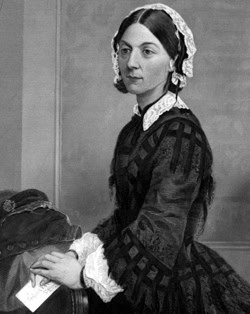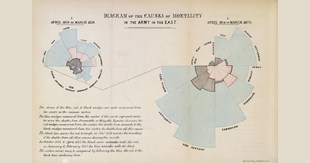Florence Nightingale 1820 – 1910
Florence Nightingale is best known for going out to the Crimean War as a nurse in 1854. This was unusual in those days because in Victorian times it was not considered appropriate for women with Florence’s education and background to undertake paid work. However Florence wanted to use her skills to help others. Before she went to the Crimea she had become interested in mathematics and statistics and so whilst she was out there she investigated the causes of death for the soldiers she was treating and realised that many more were dying from preventable disease than from battle wounds. Consequently she worked to improve the sanitary conditions of the soldiers which reduced the number of soldiers dying from these diseases.
When she returned to England, she continued this work as she had realised that the barracks where soldiers lived during peacetime were unhealthy and soldiers were dying needlessly. As well as speaking to influential politicians and Army officials she wrote reports and drew diagrams to get her points across. You can ask to see these diagrams in the Wellcome Library in London, and some of them can be seen in this Maths Today article.

Statistics and the use of data was very new in the Victorian age and much of Florence’s work centred around encouraging people to gather and keep the right data in order to better inform people in organisations who needed to make decisions. She also helped Army and Government officials correct their calculations and improve their record keeping. The guidelines she created to aid the collection of hospital statistics were agreed by the International Statistical Congress (ISC), and this, along with her work comparing the mortality rates of the army at rest with the civic male population, meant that new barracks and hospitals were constructed differently to make them less prone to outbreaks of disease. This played a major role in improving the health of the armed forces and gaining Nightingale recognition as a statistician. As a result of her work she was made a Fellow of the Royal Statistical Society – the first woman to achieve this honour.






